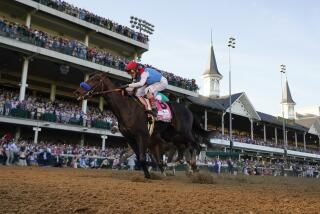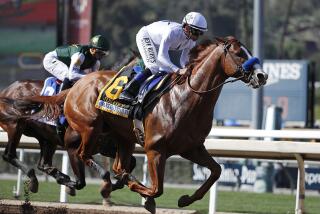Good guy Landis may have just made a bad choice
- Share via
The long and winding road that Floyd Landis pedaled out of Mennonite country and onto the wide boulevard of the Champs-ElysDees hit a dead end Thursday, when an arbitration panel overlooked some sloppy lab work and upheld a doping conviction that stripped the Tour de France winner of his title.
“I am innocent,” Landis insisted one more time in a statement, “and we proved I am innocent.”
Facing a two-year ban and the option to mount one last, even more expensive appeal, Landis’ journey only can get harder from here. But then, it was an improbable one to begin with. Improbable enough, anyway, that the first time you heard it, you wanted to believe it. I wish I believed it still.
The most willful of Paul and Arlene Landis’ six children rebelled against a strict upbringing by jumping on a bike after church and the day’s chores were done and riding into the hills alone late at night. And Floyd was fast from the get-go. He wore sweat clothes instead of a racing outfit back then, to abide by the community’s sense of modesty. But by the time Landis was 18 and already an accomplished mountain bike racer, he left the Mennonite fold and Pennsylvania Dutch country in the dust. Both felt too confining.
“I wanted to get away and find out what there was in life, on my own,” he recalled just ahead of his 2006 Tour win. “And the bicycle was a way of doing that.”
On that fateful Sunday, even as Landis stretched the yellow jersey across slim shoulders with the Arc de Triomphe in the background, a church service was taking place half a world away. Afterward, Rev. David Sensenig, who was presiding at the church that Landis’ family attended, told an Associated Press reporter that individual achievements counted for only so much in the faith. And a sign on the lawn outside the Landis home nearby reinforced his point. “To God be the glory,” it read.
But next to that one was another sign stubbornly celebrating Landis’ win. “Floyd’s the man,” it read, and that small show of exuberance spoke volumes. It was grudging admiration that for all the things about Landis that had changed, the virtues he learned as a child -- humility, hard work, conviction -- were still intact.
Now, I’m not so sure.
The case against him was tilted from the outset, loaded up with selective leaks and -- as Landis proved during a lengthy, sometimes lurid public appeal -- abetted by shoddy record keeping at the same French lab whose shoddy science led to doping allegations lodged against seven-time tour winner Lance Armstrong a few years ago.
Unlike Armstrong, though, Landis never got the benefit of the doubt. He took too long to get his act together, sputtering at the outset and then offering a string of alibis in confusing, piecemeal fashion. And more to the point, unlike Armstrong, Landis tested positive; in his case for synthetic testosterone.
Everyone from Armstrong, for whom Landis worked as a lieutenant on three winning U.S. Postal teams, to team managers, trainers and reporters who cover cycling regularly, will passionately vouch for him until this day. But some people said the same when Tyler Hamilton got caught red-handed.
Cycling is a strange sport. It’s either the dirtiest one out there, or it has the toughest, most comprehensive testing program there is and catches all the cheaters going unpunished by all the others. Or both.
More to Read
Go beyond the scoreboard
Get the latest on L.A.'s teams in the daily Sports Report newsletter.
You may occasionally receive promotional content from the Los Angeles Times.










